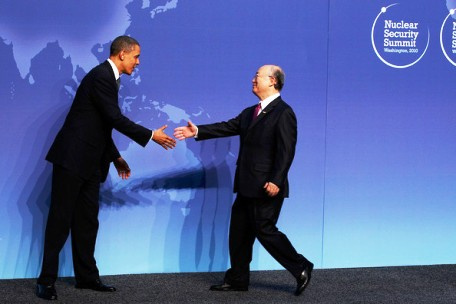Iran, The IAEA report, and the U.S. presidential election

The Republican campaign for next year’s presidential election is well under way. The candidates participate, once in a while, in debates where they have the opportunity to challenge each other. Since the U.S. economy is in bad shape and finding a viable solution to the problem of joblessness in America seems remote (if not impossible), most debates among Republican candidates have focused on domestic issues, mainly on the poor state of U.S. economy. During the past debates, the Republicans have found it useful to criticize President Obama over the present U.S. economic situation.
Last Saturday, the debate focused on foreign policy issues and this time the attack against Obama was primarily focused on current U.S. policy, particularly on Iran. The hawkish Republican candidates, citing the latest IAEA report on Iran, criticized U.S. policy towards Iran and described it as ineffective. Mitt Romney, a top Republican candidate, said, "If we re-elect Barack Obama, Iran will have a nuclear weapon." Newt Gingrich, another hard-liner, supported Romney on the idea of a pre-emptive strike to prevent Iran from acquiring a nuclear weapon. Only one candidate, Ron Paul, did not support military action against Iran, stating that it's not worthwhile to go to war.
Although criticism of President Obama’s Iran policy by the hawks and neo-conservatives has not been something new, the latest IAEA report on Iran’s nuclear activities provide more than enough ammunition for those whose interests are served with chaos and turmoil in the region. The report, while trying to give an impression that its assessment of Iran’s alleged military activities are based on credible information from different sources, states that “ Iran has carried out activities relevant to the development of a nuclear explosive device.” The fact of the matter is that most of the evidence comes from the United States and Israel; whose hostile positions towards Iran are evident and need no further explanation. Furthermore, based on the report, the alleged military activities go back to 2003. The question is, why did it take almost eight years for the Agency to “reveal” the military dimension of Iran’s nuclear activities? And why did not the former IAEA Director-General choose to “disclose” such information if these activities really threaten international peace and security?
Before the release of the IAEA report last week, Israeli media “predicted” that Iran’s foul play would soon be reported by the Agency. As a result, they embarked on an unprecedented campaign for military action against Iranian nuclear facilities. However, after the report’s release, it became obvious that there was no smoking gun in it, and the report was not a game changer. As Scott Peterson wrote in the November 9 edition of the Christian Science Monitor, “some nuclear experts raise doubts about the quality of the evidence – and point to lack of proof of current nuclear weapons work.”
The hawks in the United States and Israel had capitalized much on the IAEA report, hoping that it would create an atmosphere of anxiety and apprehension about Iranian nuclear activities across the globe requiring an urgent need to deal with it-- even militarily. However, as the dust settles on the release of the report, it has become evident that the hawks have bet on the wrong horse.
Iran will definitely remain a hot issue in the next U.S. presidential election. Republicans will do their utmost to criticize Obama’s Iran policy, particularly over the nuclear issue. For his part, Obama will try to show that he has created a solid international coalition against Iran and that his Iran policy is working. On the other hand, the Israelis will try to fish in troubled waters, thus continuing to push both Obama and the Republicans to be tough on Iran.

